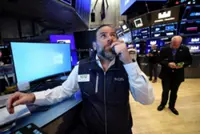LONDON: Euro zone stocks opened 2017 by climbing to their highest in more than a year on Monday after data showed manufacturers in the currency bloc ramped up activity at the fastest pace in more than five years.
With all of Asia's major markets closed for the New Year holiday - along with Britain and Switzerland in Europe - trade was thin, which could cause some volatility. The United States and Canada will also be closed.
The euro zone's blue-chip Euro STOXX 50 index rose half a percent to its highest since December 2015 after the purchasing managers' index (PMI) for factories in the currency bloc came in at 54.9 - well above the 50 mark that separates growth from contraction.
The euro, though, took no comfort from the figures, slipping 0.4 percent back below $1.05 after climbing to as high as $1.07 during a flash surge in low trading volumes in Asia on Friday. [FRX/]
Analysts said the fall was mainly due to a resumption of an up-trend in the greenback that saw it surge to 14-year highs in December on the view the U.S. Federal Reserve will hike rates as many as three times this year, and that Donald Trump's administration will stoke growth and inflation with a programme of fiscal expansion.
The dollar index - which measures the greenback against six major rivals - climbed half a percent, having hit a two-week low on Friday.
"In the last days of 2016 we saw the dollar retreat somewhat, and there might be some sense of a correction from Europe this morning. I don't see any fundamental drivers for the moves," said Commerzbank currency strategist Esther Reichelt, in Frankfurt.
Italy's top share index hit its highest level since January last year, outperforming other major European stock indexes, with a rally in its banks and a strong manufacturing report improving sentiment.
Italy's FTSE MIB index was up 1.5 percent by 1215 GMT at its highest level since January 15 of 2016. Germany's DAX was up 0.9 percent at its highest in nearly 17 months, while France's CAC was up 0.5 percent at a 13-month peak.
As European stocks climbed, a rally in risk appetite also pushed down the yields on lower-rated government bonds in the euro zone to multi-week lows. Italian, Spanish and Portuguese 10-year bond yields were down roughly 8 basis points each on the day.
ISLAMIC STATE ATTACKS
A gun attack in Istanbul that killed 39 people was seen having little impact on markets, with the Japanese yen - traditionally used as a safe haven - falling 0.3 against the dollar, close to an 11-month low.
Islamic State claimed responsibility on Monday for the New Year's Day mass shooting, which was carried out by a lone gunman in a packed nightclub in the Turkish city.
A separate Islamic State attack in Baghdad killed 24 people on Monday.
"After all the big political shocks last year and muted market reaction, it is tempting to argue that the markets are very resilient," said Finland-based Nordea chief market strategist Jan Von Gerich.
"I would say this is too optimistic an assumption and I think we will see more volatility this year."
The Turkish lira slipped half a percent after the attack to 3.5440 per dollar, close to a record low of 3.5840 the lira touched in December.
"The problem is that this once again stresses the increasing instability and the security issues, and we’re seeing tourist numbers going down, which will have a lasting negative impact on the Turkish economy...and that’s Turkish lira-negative," said Commerzbank's Reichelt.
Data released earlier in the day showed China's manufacturing sector expanded for a fifth month in December, though growth slowed a touch more than expected in a sign that government measures to rein in soaring asset prices are starting to have a knock-on effect on the broader economy.
The Chinese yuan suffered its biggest annual loss in more than 20 years in 2016, with an almost 7 percent fall making it the worst-performing currency in Asia.
Digital currency bitcoin started the year by jumping above $1,000 for the first time since late 2013.- Reuters





